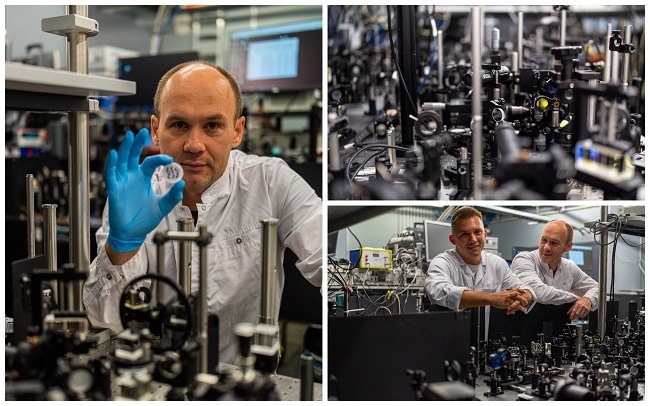A research team from Skoltech and Bergische Universität Wuppertal in Germany, led by Vice President of Photonics at Skoltech Pavlos Lagoudakis, a laureate of the Vyzov (Challenge) prize, have created a universal NOR logical element (from NOT — a negation operator and OR — a disjunction operator). It is based on polariton condensates, operates at room temperature, has multiple inputs, can work hundreds of times faster than electronic analogues, and is also completely optical — that is, it works without electric current. Importantly, such logic elements can be reproduced and connected on a circuit, that is, cascaded. The research results are presented in the Nature Communications journal.
 Study co-authors Denis Sannikov (in the left photo and on the right in the bottom right photo) and Anton Putintsev. Image Credit: Anton Putintsev/Skoltech.
Study co-authors Denis Sannikov (in the left photo and on the right in the bottom right photo) and Anton Putintsev. Image Credit: Anton Putintsev/Skoltech.
According to the team, the new NOR gate can be used to create any types of logic elements necessary for optical chips to perform calculations without the participation of electric current. The results of this study bring scientists closer to the long-held dream of creating optical computers that can work hundreds of times faster than traditional computers based on electronic technologies.
“Our experiments have developed another piece of the missing puzzle towards fully optical computers by implementing a cascaded optical universal logic gate in practice for the first time. In fact, modern computers are limited in the frequency of electronic processor operation to several GHz. Since the 80s, to increase the speed of calculations, manufacturers have constantly increased the clock frequency of the processor, but then faced a fundamental physical limitation — if you raise the processor frequency above several GHz, then the processor simply turns into an electric heater. In 2019, our laboratory developed the world’s first ultrafast optical polariton transistor, which operates at room temperature and serves as the main building block of optical polariton logic circuits. Why is optics better? Most importantly, it is not limited to a few GHz clock frequency. We can work with polariton transistors with a frequency of up to 1 THz, which is about 300 times faster than electronic analogues. In our another work, we previously showed that one photon is enough to control an optical polariton transistor, which cannot be implemented in any other optical system,” said Denis Sannikov, the first author of the work, the deputy head of the Hybrid Photonics Laboratory at the Skoltech Photonics.
Logic gates perform various logical operations in the device — conjunction, disjunction, negation, etc. The computer processor consists of billions of transistors combined into these logic elements, which, when some input signal is applied, perform internal calculations and eventually, for example, displays an image on the screen. The logic gate receives a signal with logical levels of “0” or “1” at each of its inputs, and returns a signal of “0” or “1” following the predefined rules. Usually electronic gates have 2-8 inputs and 1-2 outputs, but in the experiments of the Skoltech Hybrid Photonics Laboratory, the new optical universal gate successfully coped with 12 inputs — this is another competitive advantage.
“To create a universal gate, we used the special properties of ‘liquid light’ — that is what polariton condensates are called, capable of amplifying weak optical signals tens of thousands of times. To create such a ‘liquid light’, first we need to condense the polaritons into the ground state. If we draw a parallel, it resembles water vapor in the air, that turns into the water droplets on a cold window. We went further and learned how to condense polaritons not only into the ground state, but also into a non-ground state at higher energy. This effect has allowed for solving the long-standing problem of all-optical, logical elements which consists in disabling the optical signal with the help of light, switching a logical unit to zero,” Denis Sannikov added. “Photons, unlike electrons, do not interact with each other in some way, and therefore the creation of such an optical logic converter has long remained a physical and technological challenge. We achieved this task by using the unique properties of ‘liquid light’, combining the properties of both photons and electrons and enabling the creation of an all-optical polariton universal gate.”
The research was supported by Russian Science Foundation’s grant No. 23-72-00059 titled “Optical lateral logic gates based on polariton condensates in perovskite films.”